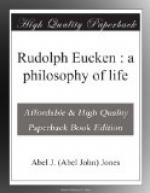So Eucken will have nothing to do with the idea of mediation in its doctrinal significance—pointing out that “the idea of mediation glides easily into a further mediation.” “Has not the figure of Christ receded in Catholicism, and does not the figure of Mary constitute the centre of the religious emotional life?”
He does, however, lay great store by the help that a man may be to other men in their upward path: “The human, personality who first and foremost brought eternal truth to the plane of time, and through this inaugurated a new epoch, remains permanently present in the picture of the spiritual world, and is able permanently to exercise a mighty power upon the soul ... but all this is far removed from any idea of mediation.”
Eucken believes in revelation, but through action, and not through contemplation. To the personality struggling upward, with its aims set towards the highest in life, the spiritual life reveals itself. He does not confine revelation to certain periods in time, and believes that such revelation comes to all spiritual personalities.
He holds, too, that the spiritual personalities are themselves revelations of the Universal Spiritual Life, and that the Spiritual Life does reveal itself most clearly in personalities.
How the revelation comes he does not discuss in any detail, but he is very certain that it comes through action and fight for the highest.
It is perhaps largely due to his activistic standpoint that Eucken does not deal with prayer. In the Truth of Religion, which deals very fully with most aspects of religion, and purports to be a complete discussion of religion, no treatment of prayer is given. He speaks of the developing personality as drawing upon the resources of the Universal Spiritual Life, but this appears to be in action, and not in prayer or communion.
He is ever suspicious of intellectual contemplation, and this leads him to attribute less importance than perhaps he should to mysticism, to prayer, adoration, and worship. He admits that mysticism contains a truth that is vital to religion, but complains that it becomes for many the whole of religion. Its proper function is to liberate the human mind from the narrowly human, and to emphasise a total-life, the great Whole. It fails, however, “because it turns this necessary portion of religion into the sole content. To it, religion is nothing other than an absorption into the infinite and eternal Being—an extinguishing of all particularity, and the gaining of a complete calm through the suspension of all the wear and tear of life.”




